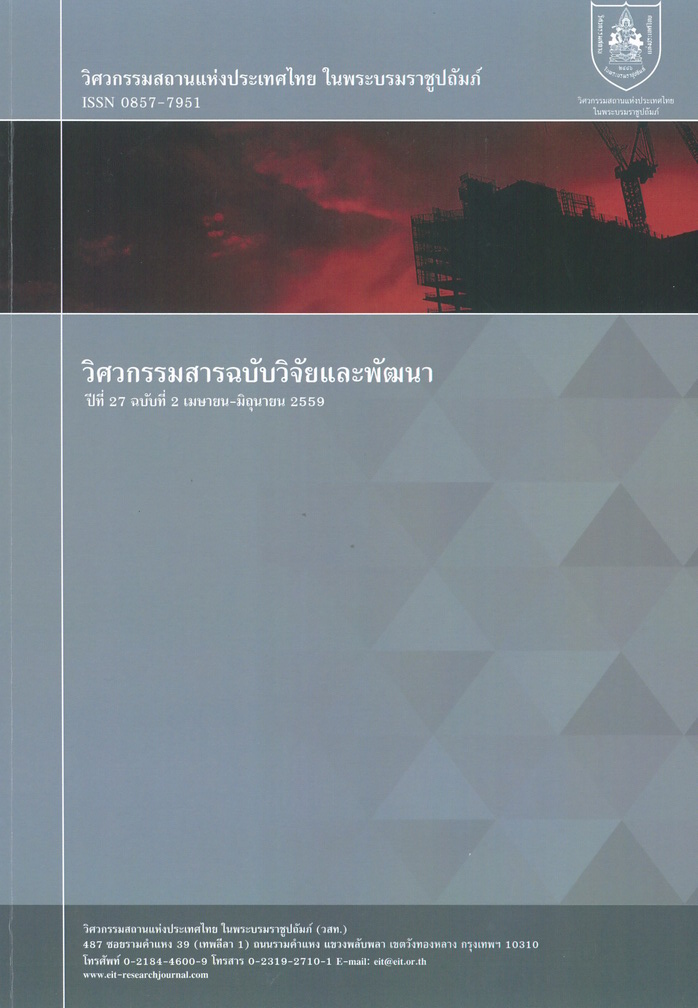IMPACT OF PVA FIBERS ON ASR EXPANSION OF LIMESTONE
Main Article Content
Abstract
บทความนี้รายงานการศึกษาผลกระทบของเส้นใย Polyvinyl Alcohol (PVA) ต่อการขยายตัว กำลังรับแรงอัดและโมดูลัสความ ยืดหยุ่นของคอนกรีตที่เกิดปฏิกิริยาแอลคาไล-ซิลิกาจากหินปูนบางชนิด โดยศึกษาด้วยแท่งตัวอย่างขนาด 4.0x4.0x19.5 ซม. และ 5.0x5.0x5.0 ซม. ที่ผันแปรปริมาณเส้นใยระหว่างร้อยละ 0.00-1.00 โดยปริมาตร และเร่งปฏิกิริยาเคมีตามข้อแนะนำของ RILEM AAR-2 เป็นเวลา 28 และ 56 วัน จากการศึกษาพบว่า สภาวะการบ่มก่อนเร่งปฏิกิริยามีผลต่อการขยายตัว โดยแท่งตัวอย่าง ที่มีเส้นใย PVA ร้อยละ 1.00 ที่บ่มในอากาศ 2 วัน แล้วบ่มด้วยน้ำที่อุณหภูมิ 80°C อีก 1 วัน ลดการขยายตัวลงร้อยละ 16 และ มีแนวโน้มดีขึ้นโดยลำดับขณะที่ส่วนผสมชุดอื่นๆ มีการขยายตัวใกล้เคียงกับชุดควบคุมที่ไม่ผสมเส้นใย เมื่อบ่มแท่งตัวอย่างด้วยน้ำ 80 °C ต่อเนื่อง 3 วัน การขยายตัวมีแนวโน้มเพิ่มขึ้นเล็กน้อย โดยแท่งตัวอย่างที่ผสมเส้นใย PVA มีการขยายตัวต่ำกว่าชุดควบคุม ร้อยละ 16 และมีแนวโน้มดีขึ้นอย่างต่อเนื่องเช่นกัน และพบว่าประสิทธิภาพในการรักษากำลังรับแรงอัดและโมดูลัสความยืดหยุ่น ไม่ขึ้นอยู่กับปริมาณเส้นใยและมีแนวโน้มลดลงตามความรุนแรงของปฏิกิริยา โดยมวลรวมที่เห็นการเปลี่ยนสภาพบริเวณขอบชัดเจน กำลังรับแรงอัดจะได้รับผลกระทบในระดับที่สูงกว่าทั้งนี้กลุ่มตัวอย่างที่เร่งปฏิกิริยา 28 วัน มีกำลังรับ แรงอัดและโมดูลัส ความยืดหยุ่น ต่ำกว่ากลุ่มตัวอย่างที่ไม่เร่งปฏิกิริยาร้อยละ 3-28 และร้อยละ 3-10 ตามลำดับ
This paper reported the effects of Polyvinyl Alcohol (PVA) fiber on expansion, compressive strength and modulus of elasticity (E) of concrete subjected to Alkali-Silica Reaction (ASR) from some type of limestone aggregates. Samples of 4.0x4.0x19.5 cm. and 5.0x5.0x5.0 cm., varying percentage of PVA by volume (0.00-1.00), were studied. The accelerated condition according to RILEM AAR-2 provision for short and long term (28 and 56 days) was used in the study. The impact of curing condition before the samples subjected to accelerated condition was observed. The expansion of 1.00% PVA samples under curing condition of 2 days in room temperature and 1 day in 80 °C water significantly decreased by 16% while that of the rest was in same range of the control (0.00% PVA). For the extended curing in 80 °C water to 3 days, the expansion of the control samples was slightly larger than that of the first case. Fibers appeared to reduce expansion of about 16% for all mixtures with PVA and the trend of continued improvement was observed. Compressive strength and E appeared to be fiber content-independent but decreased when the accelerated time increased. In case of dark rim aggregates was observed, the impact on compressive strength was larger than that of E. Both compressive strength and E of those samples subjected to 28 days acceleration were lower than those of non ASR of about 3-28% and 3-10% respectively.
Article Details
The published articles are copyright of the Engineering Journal of Research and Development, The Engineering Institute of Thailand Under H.M. The King's Patronage (EIT).

